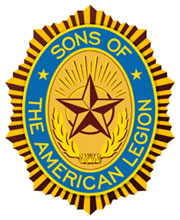Sons of the American Legion

Sons of the American Legion emblem
|
|
| Motto | "For God and Country" |
|---|---|
| Established | September 12–15, 1932; 83 years ago |
| Type | Patriotic-Hereditary society |
| Legal status | Federally chartered corporation |
| Purpose | Patriotic, fraternal, benevolent |
| Headquarters | 700 N. Pennsylvania St., Indianapolis, Indiana |
| Coordinates | 39°46′37″N 86°09′22″W / 39.776996°N 86.156201°W |
|
Region served
|
Worldwide |
|
Membership (2016)
|
367,948 |
|
Official language
|
English |
|
National Commander
|
Jeff Frain |
|
National Adjutant
|
Brian O'Hearne |
|
Parent organization
|
American Legion |
| Affiliations |
|
| Website | legion |
The Sons of the American Legion is a patriotic service organization formed on September 12–15, 1932. The S.A.L. is made up of male descendants of people who served in the United States Armed Forces during times specified by the American Legion. The Sons of the American Legion's mission to serve veterans, the military and their families is carried out through its hundreds of outreach programs delivered by its members, volunteers and national headquarters. The Sons of the American Legion's national headquarters is located in Indianapolis.
Their main mission is to sponsor programs that its parent organization, The American Legion, does to improve veterans communities, such as scholarships, veterans help programs (i.e. ending veterans homelessness), and youth sports. They also promote national security, patriotism, and devotion to veterans.
The establishment of the Sons of the American Legion as a non-political, no-sectarian civilian organization was authorized by action of the 14th National Convention of the American Legion in Portland, Oregon September 12–15, 1932.
In 1939, the S.A.L. was riding the crest and had a numerical size of about seven percent as large as the parent organization. The S.A.L. organization seemed destined to grow even larger, but looming on the horizon was World War II. With the passing of time, thousands of young men suddenly found themselves old enough o be in the armed services.
Many of the S.A.L. members never returned from World War II and those that did found that their serve had made them eligible to join the ranks of the American Legion itself, which, in 1942 opened the door to the returning World War II veterans.
Membership dropped from a high of 72,633 in 1939 to a low of 5,631 in 1953. Many factors caused the lean years for the S.A.L. program. The former S.A.L., now veterans of World War II, had no children in the immediate postwar years. Housing shortages, a nation on the move, the G.I. Bill that sent thousands of veterans back to school, and the Korean War that put reservists back in uniform were some of the contributing factors.
...
Wikipedia
